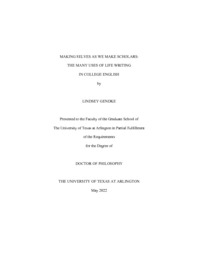| dc.description.abstract | This dissertation addresses the perennial question, for both new and more seasoned English professors, “What should we teach in English?” In composition, “What types of writing should we teach?” And in literature, “what literature, and which authors, should we read?” In the current age where teachers are concerned with promoting diversity, equity, and inclusion, perhaps these questions are more relevant than ever. Thus, employing Wayne Booth’s rhetorical stance as my theoretical frame, I inquire 1) what are the most pressing needs of traditional-age college students, and 2) what theories and teaching strategies uncovered in recent English studies have the potential to reach the largest audience and do the most good? To begin answering these questions, I position college students themselves as a crucial consideration in preparing college English curricula. According to the psychology literature, some key tasks faced by this population, often referred to as “emerging adults,” are identity exploration, instability, and a feeling of being in-between. Recent statistics also reveal a “mental health crisis” in this population, which has been exacerbated by the COVID-19 pandemic. To address these problems, I employ two interventions: the first is my theoretical framework, the rhetorical stance, a term coined by Wayne Booth, which holds that in order to effectively reach an audience, a speaker (or teacher) must balance all three elements of the rhetorical triangle: speaker, topic, and audience. The second is life writing, a genre that, in recent decades, has become popular for its inclusive nature. Through using these multipurpose tools of our discipline–the rhetorical stance and various forms of life writing–I argue that teachers can help students not only gain academic skills, but also crucial life skills to help them in private as well as public contexts.
Throughout this dissertation, then, I share research in composition theory as well as life writing studies to discuss ways English teachers can aid students’ personal as well as professional and academic development. Specifically, I discuss research and my own teaching experience related to three forms of life writing: free writing or journaling; lower-case expressive writing (a term from composition scholarship); and upper-case Expressive Writing (a term from psychology scholarship). In the latter chapters, I also consider benefits of studying life writing as literature: namely, as literature, life writing is a genre that has historically included men, women, and minority writers of all stripes, and so can be instructive on many levels, personal as well as social. However, whereas many other scholars champion life writing for political ends (and rightly so), as a scholar with deeply held religious beliefs, I also claim life writing for religious teachers and students who would be inspired, and instructed, by reading life stories penned by heroes of their faith. In short, I argue that, for the current cultural moment, life writing is ideal for both composition and literature courses, both as writing activities and as texts of study, because life writing speaks to all audiences, and it invites all to participate. Put another way, life writing offers limitless possibilities for supporting our students not just as scholars, but also as selves. | |


